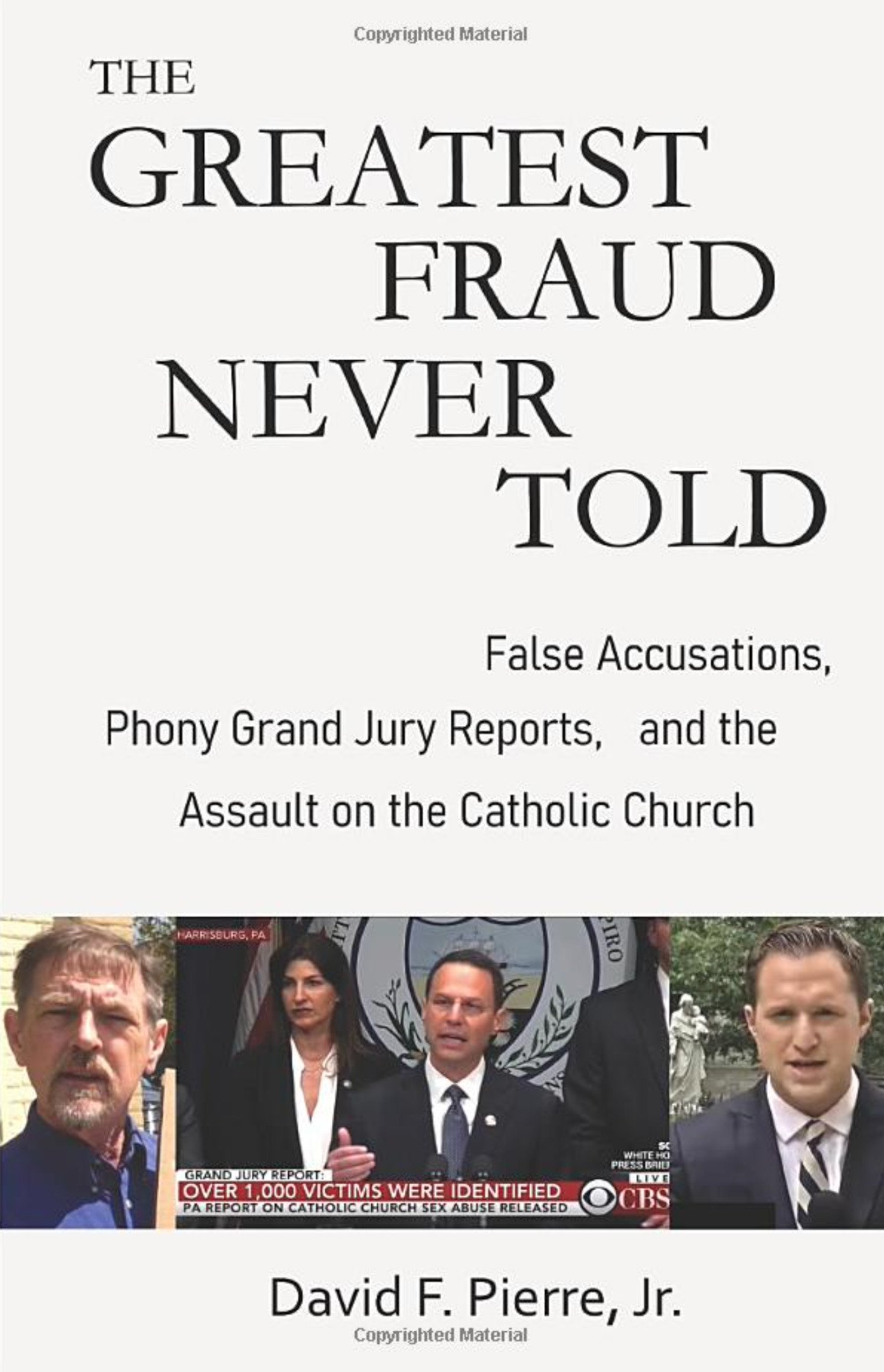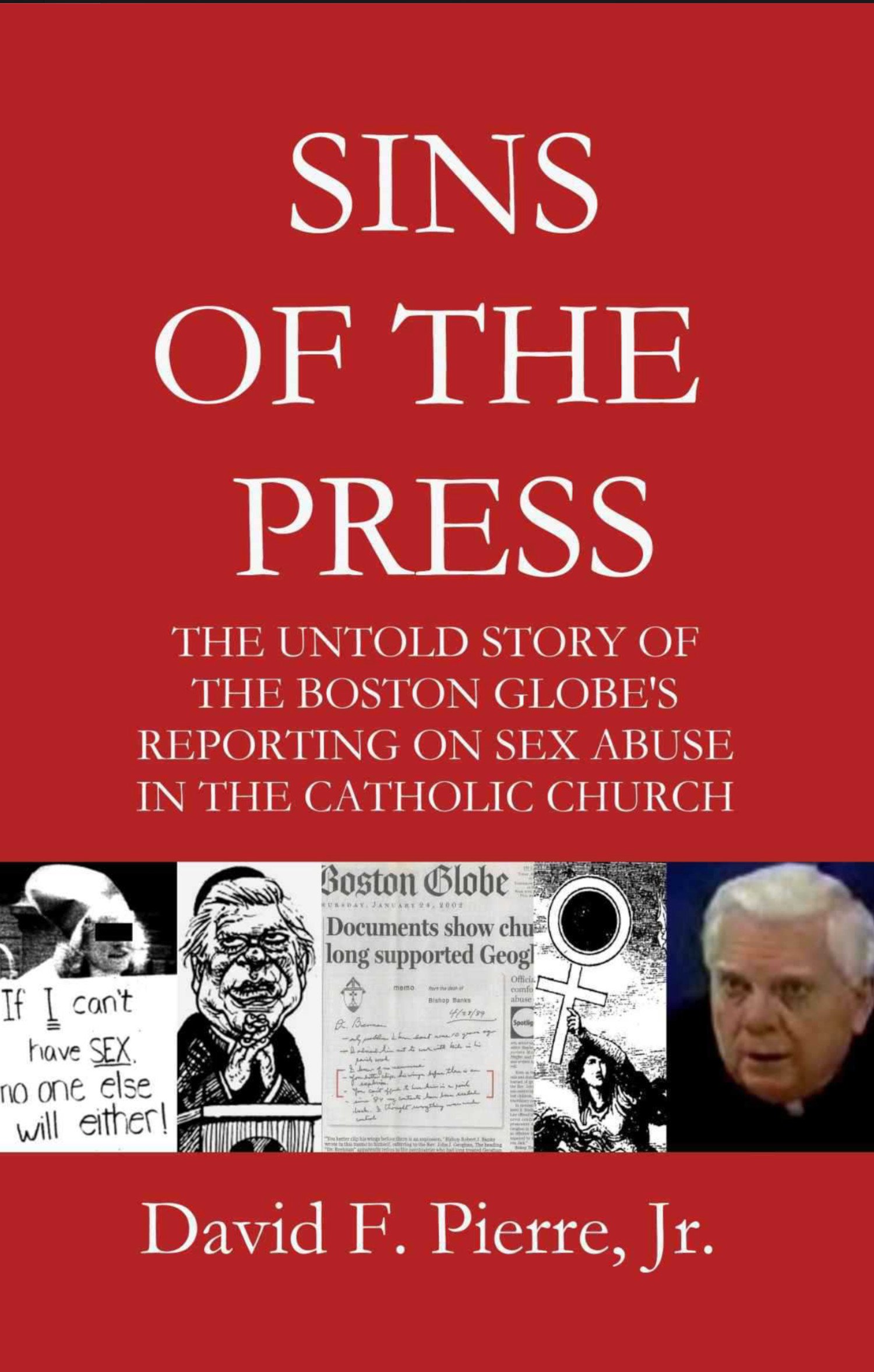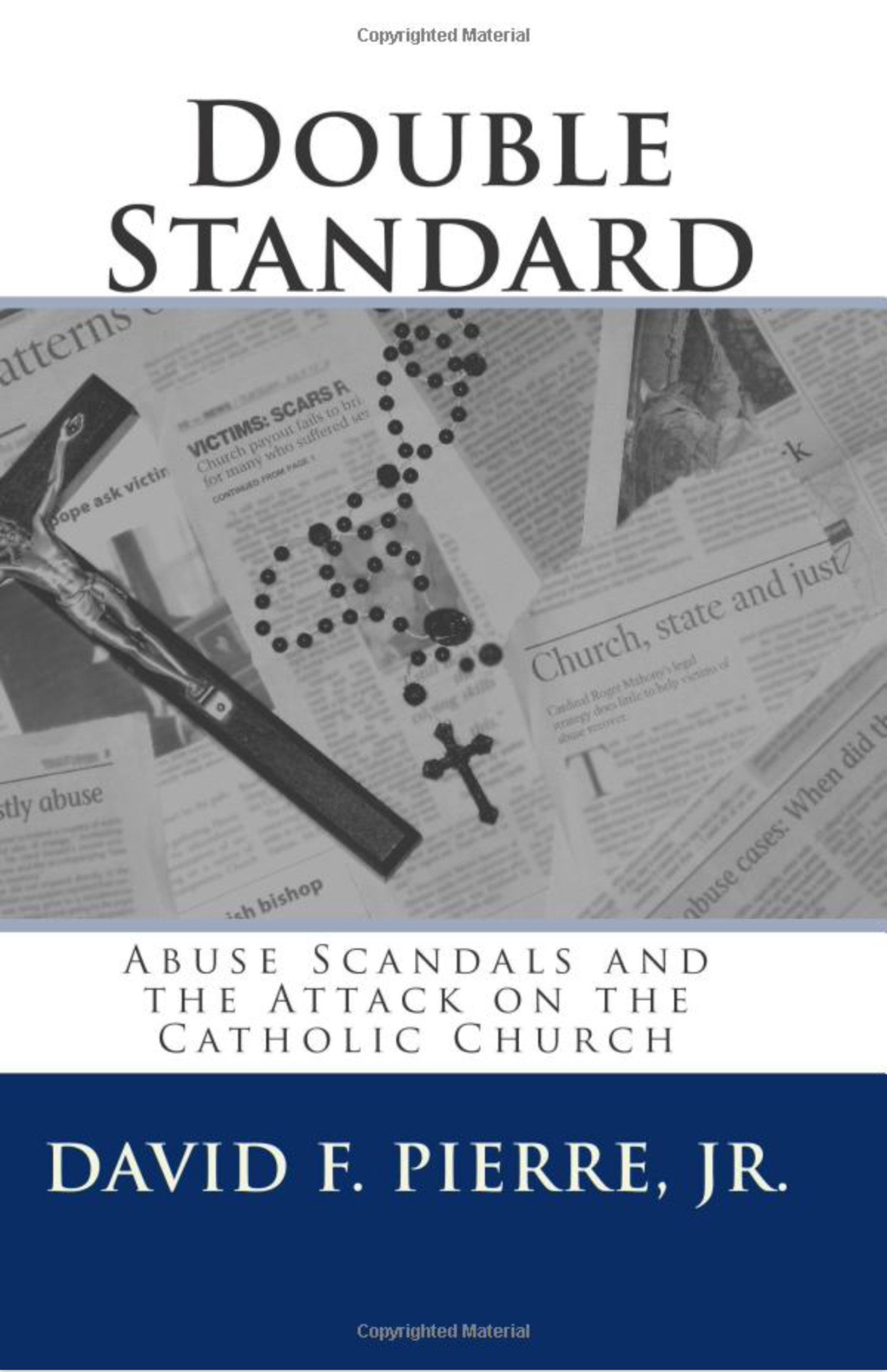The Media Report: Catholic Priests Falsely Accused
David F. Pierre, Jr. is a widely acclaimed author on the Catholic abuse story. One of the cases presented in his book, entitled above, is that of Fr. Gordon MacRae.
October 19, 2022 by David F. Pierre, Jr.
A Message from David F. Pierre, Jr.:
“When I published my book Catholic Priests Falsely Accused over a decade ago, I never thought that the contents would still reverberate today and that the chapter on the case of Fr. MacRae would especially impact its readers. Since the book was released, there have been numerous additional revelations further vindicating Fr. MacRae — as Beyond These Stone Walls has compiled — and I consider the chapter just one piece of many chronicling the many important aspects of the case.”
The case of Father Gordon J. MacRae — from the Diocese of Manchester (New Hampshire) — falls into a category all its own. No single case in the Catholic Church abuse narrative has been more feverishly debated. The case has bitterly polarized observers for several years. There are those who maintain the priest’s guilt and those who forcefully assert his innocence.
Since 1994, Fr. MacRae has been incarcerated in the New Hampshire State Prison for Men. On September 23, 1994, a jury convicted the priest of repeatedly molesting a teenage boy during counseling sessions and elsewhere. A judge later sentenced the cleric to 67 years in prison.
Fr. Gordon vehemently asserts his innocence and claims that he is falsely accused. With the help of outside supporters, an old typewriter, and the use of traditional postal mail, Fr. MacRae authors BeyondTheseStoneWalls.com from his small prison cell. Fr. MacRae utilizes the blog not just as a forum to assert his innocence. He also posts thoughtful spiritual and theological commentary. BeyondTheseStoneWalls.com is truly a compelling venue on the Internet.
What are the facts in this controversial case? Those who believe Fr. Gordon’s guilt is demonstrable gesture to reams of court documents and articles available at an anti-Church watchdog site. However, as with so many other cases, there is an alarming opposite side to Fr. MacRae’s narrative that has not been widely told.
The criminal conviction of Fr. Gordon in 1994, which would catapult him to his sentence of 67 years in prison, rested on the uncorroborated testimony of one individual. The man’s name is Thomas Grover [who at this writing is 55 years of age]. Amazingly, two of Thomas’ brothers and two other men — known to the Grover boys — also accused Fr. Gordon of molesting them. Yet only the claims of Thomas Grover would be the subject of an actual criminal trial.
It is certainly a matter of debate whether the justice system yielded a fair trial for Fr. Gordon. Although the accuser Grover had a lengthy juvenile and adult criminal history of “theft, assault, forgery and drug offenses,” the presiding judge, the Hon. Arthur D. Brennan, did not allow the priest’s defense to present this as evidence. Had the judge allowed this important information, the jury may have examined Grover’s claims a bit more critically.
Indeed, Thomas Grover’s accusations were quite untenable. According to the court testimony of Grover, Fr. Gordon repeatedly sexually assaulted him about a decade earlier during four different counseling sessions in 1983, when he was fifteen years old. Asked at trial why he would repeatedly return week after week to counseling sessions at which he had been previously attacked, Grover testified that he had “repressed” the memory of the experience after each assault. He claimed that he had an “out-of-body experience” which resulted in him completely forgetting the fact that he had been victimized during the previous visit.
In addition, according to trial testimony, when Grover attended a drug treatment center in 1987, he told a counselor that his father had abused him. Grover did not cite the priest as an abuser. In fact, the accuser identified the priest by name to his counselor in only one instance. Grover wrote Fr. MacRae’s name on his discharge contract indicating that the priest would be his sponsor in sobriety. She reported that Grover went on in therapy to accuse so many people of sexually abusing him that the staff thought “he was going for some kind of sexual abuse victim world record.” But he never accused Fr. MacRae.
In a previous deposition under oath, Grover made more bizarre claims about Fr. Gordon, one of which was that the priest had chased him with a car. “And he had a gun,” the accuser added, “and he was threatening me and telling me over and over that he would hurt me, kill me, if I tried to tell anybody, that no one would believe me. He chased me through the cemetery and tried to corner me.” However, at Fr. MacRae’s trial, the prosecution did not call a single witness to corroborate the public spectacle of a priest with a gun in a car chasing a boy through a cemetery.
As the trial progressed, even the prosecution could see that Thomas Grover had serious credibility problems. In the middle of the trial, after Grover’s flimsy appearance, the prosecution offered Fr. Gordon a plea bargain in which the priest would agree to serve only a maximum of two years in jail in exchange for an admission of guilt. It was not the first time the prosecution extended such a generous deal. On two other occasions before the court case — six months before trial and again a week before trial — the state offered plea deals to Fr. Gordon, both of which would ask that he serve no longer than three years in prison. The prosecution would have loved to have seen the priest take the offers.
But Fr. Gordon was adamant. He would not plead guilty to charges that he maintained were false. “I am not going to say I am guilty of crimes I never committed so that the Grovers and other extortionists can walk away with hundreds of thousands of dollars for their lies,” the priest asserted.
The trial progressed, and although Thomas Grover’s testimony may have seemed hard to believe on the surface, the accuser was effectively theatrical during his appearance. He railed against the priest for “forcing” him to withstand the agony of a trial. In addition, during Grover’s testimony, the accuser’s therapist — retained by the man’s contingency lawyer — reportedly coached her former patient while sitting in open view inside the courtroom. Apparently directed by the therapist, Grover became emotional at strategic moments during his testimony. Courtroom witnesses have reported that when Grover was confronted with difficult questions, the therapist would gesture to her patient that he should cry. Grover would then become emotional and dramatic, often leading the judge to call a recess.
Meanwhile, Judge Brennan purposefully ordered the jury to “disregard inconsistencies in Mr. Grover’s testimony.” To the shock of Fr. Gordon, the jury returned with a guilty verdict in less than 90 minutes.
At Fr. Gordon’s sentencing, the prosecution efficiently utilized accusations of abuse charges by other men. Stomach-turning stories of child pornography also impacted the jury. An angry Judge Brennan railed against the convicted priest. He berated the cleric for his “lack of remorse” over his crimes. (Lost on the judge was the fact that the priest forcefully maintained his innocence and had rejected three different plea offers.) Building upon his rage, the judge added, “The evidence of your possession of child pornography is clear and convincing.”
There was one problem, however. “There was never any evidence of child pornography,” the lead detective on the case later admitted to The Wall Street Journal.
Under New Hampshire prison guidelines, Fr. Gordon will never be eligible for parole unless he admits guilt. As with the case of Msgr. McCarthy (Chapter 6), Father Gordon’s narrative highlights the zeal with which some detectives will seek a prosecution, despite the claims presented to them.
The criminal case against Fr. Gordon actually began when one of Thomas Grover’s brothers, Jonathan, approached Keene, New Hampshire, Detective James McLaughlin with the claim that Fr. Gordon had abused him years earlier. However, Jonathan did not just accuse Fr. Gordon of abuse; he accused a second priest as well — Fr. Stephen Scruton. However, as Detective McLaughlin further examined Jonathan’s claims, he realized that Fr. Scruton did not even serve at the parish of the alleged abuse until years after Jonathan claimed that the acts took place.
With this startling discovery of fact, many detectives would have concluded that Jonathan was not being truthful. There would even be more reason to doubt Jonathan when two of his brothers came forward to claim similar abuse by the two priests. But rather than dropping the investigation altogether and issuing charges against Jonathan for filing a false report, McLaughlin continued his crusade by simply scrubbing the existence of Fr. Scruton from future investigations altogether. [It was at this point in police reports that Detective McLaughlin gave the Grover brothers a copy of Fr. MacRae’s resume “to help them with their dates.”]
In the course of trying to nab Fr. MacRae, McLaughlin initiated a couple of attempted “stings” to get the priest to admit to the alleged abuse. One was a letter claiming to be from Jonathan Grover that “recalled” several sexual escapades and declared that the “sex between us was very special.” Fr. Gordon replied to the letter by saying that the letter writer must be an imposter, because no such acts ever took place. McLaughlin also attempted a number of secretly recorded phone calls to try to bust the priest, but none of them yielded anything incriminating. The calls were an utter failure, by all investigative measures.
Fr. Gordon would have been out of prison long ago if he had accepted the plea deals and admitted guilt. Instead, in staunchly maintaining his innocence, he will likely live in a prison cell for the remainder of his life.
In recent years, even more evidence has surfaced to support the claim that Fr. Gordon was falsely accused. One of the priest’s accusers (not Thomas Grover) has reportedly recanted his claims. In early 2011, a document surfaced in which the accuser plainly acknowledges that fraud was committed against Fr. Gordon and the Catholic Church. According to a New York investigative writer, the document says:
“I was aware at the time of the trial, knowing full well that it was bogus and having heard of the lawsuits and money involved, and also the reputations of those making accusations … whom I went to school with. It seemed as though it would be easy money if I would also accuse Fr. Gordon of some wrongdoing. … I believed easy money would come from lawsuits against MacRae. I was at the time using drugs and could have been influenced to say anything they wanted for money.” [Signed statement of Steven Wollschlager]
So despite the tempting opportunity of a high-stakes payout, the man refused to go along with what he saw was a gross money-grubbing scam.
In 2005 and 2013, Pulitzer Prize-winning writer Dorothy Rabinowitz profiled the case of Fr. Gordon for a trio of eye-opening articles for The Wall Street Journal. After months of studying court documents and combing through testimonies, Rabinowitz concluded that Fr. MacRae was clearly a victim of fraud and was wrongly convicted.
Sadly, under intense public pressure from events of the past decade, Church officials have essentially abandoned Fr. Gordon. Despite the fact that evidence possibly indicating innocence continues to surface, Church officials have kept their distance from the incarcerated cleric. While Church officials have publicly supported the prosecution of Fr. Gordon, there are reports that privately they admit that the cleric may have been falsely accused. For example, in 2011, two signed statements surfaced which claim that Bishop John McCormack, the longtime head of the Diocese of Manchester, has privately stated that he believes Fr. Gordon is innocent.
One such statement comes from a man who once worked at a television station that was to profile Fr. Gordon’s case. It quotes Bishop McCormack as saying to the man, “Understand, none of this is to leave this office. I believe Father MacRae is not guilty and his accusers likely lied. There’s nothing I can do to change the verdict,” Bishop McCormack said, according to the statement. [See Fr. George David Byers, “Omertà in a Catholic Chancery: Affidavits Expanded”]
The man submitted his statement about Bishop McCormack’s remarks because he believed there was a glaring injustice in the inconsistency between the Bishop’s public actions and his private statements.
Should the case against Father Gordon MacRae be reviewed? Considering the totality of the evidence, especially that which has surfaced in recent years, the answer is, “Yes.” Justice demands it.
In addition, recent developments and emerging information will likely result in appeals of Fr. MacRae’s case. Stay tuned.
David F. Pierre, Jr. is the country’s leading observer of the media’s coverage of the Catholic Church abuse narrative and is the author of four books. His most recent is The Greatest Fraud Never Told: False Accusations, Phony Grand Jury Reports, and the Assault on the Catholic Church. David has been heard on National Public Radio (NPR) and cited in the New York Times, the Chicago Tribune, USA Today, and many other media outlets. He is the creator and author of TheMediaReport.com, an educational cooperative to chronicle and monitor the mainstream media’s coverage of the Catholic Church sex abuse narrative. He lives with his wife and family in Massachusetts.
Bogus Charges Against Priests Abound
Editor’s Note: In a 2012 article for Catalyst, the Journal of the Catholic League for Religious and Civil Rights, Rev. Michael P. Orsi, research fellow in Law and Religion at Ave Maria School of Law, wrote an extended review of David F. Pierre’s book cited above. His review is titled “Bogus Charges Against Priests Abound.”
The following is an excerpt from that review:
Catholic Priests Falsely Accused: The Facts, The Fraud, The Stories by David F. Pierre, Jr., Mattapoisett, Massachusetts: www.TheMediaReport.com
“David Pierre is one of the country’s leading observers of the Catholic Church abuse narrative. In Catholic Priests Falsely Accused: The Facts, the Fraud, the Stories, he presents case studies backed by hard data which clearly demonstrates some of the injustices foisted on Catholic priests and the Church. ...
“A sure way to ameliorate the injustices perpetrated against priests and to rehabilitate the reputation of the Church would be to re-examine the cases of those priests found guilty due to false or dubious abuse claims filed against them. The widely reported case of Fr. Gordon MacRae, of the Diocese of Manchester, New Hampshire, would be a good place to start. Pierre outlines it in his book. It is quite obvious that Fr. MacRae did not receive a fair trial according to the facts cited in a piece published in The Wall Street Journal.
“MacRae’s accuser, a fifteen year old boy, had a lengthy juvenile record and presented doubtful evidence in trial testimony. The judge even went so far as to order the jury to ‘disregard inconsistencies in Mr. Grover’s (his accuser) testimony.’ Father MacRae, protesting his innocence, refused a plea bargain deal of two years in prison. Now he is serving a 67 year sentence. His own, now retired, bishop believes him to be innocent. What a moral boost this would be for the nation’s priests and for the Catholic laity ... to have this case reopened!”
+ + +
BREAKING NEWS: Just as this post went to print, David F. Pierre, Jr. and The Media Report published “Twice Is a Charm? Wall St. Journal Again Profiles Stunning Case of Wrongfully Convicted Priest Fr. Gordon MacRae.”
To learn more about the rampant fraud, dishonest grand jury investigations, and career-building prosecutorial misconduct behind the Catholic Church abuse story, please consult these additional books by David F. Pierre, Jr. and The Media Report. Father Gordon MacRae also urges readers to subscribe to The Media Report.





